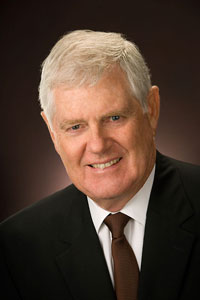New START Critics Can't Explain Away Military Support
October 22, 2010
Featured Image
Today's top nuclear policy stories, with excerpts in bullet form.
Stories we're following today: Friday October 22, 2010.
Treaty Critics Can't Explain Away Military Support for New START - Lt. General Dirk Jameson for The Hill [link]
- Defense Secretary Robert Gates made it clear that the treaty had the “unanimous support of America's military leadership.”
- The reason for that support is simple. The treaty makes us safer.
- Senate committees heard testimony in support of the treaty from former Republican and Democratic officials alike, including Secretaries of Defense James Schlesinger and William Perry, former Secretaries of State James Baker and Henry Kissinger and former National Security Advisors Lieutenant General Brent Scowcroft and Stephen Hadley.
- Thirty former national security officials from both political parties – including Colin Powell, Frank Carlucci, Madeleine Albright, Chuck Hagel and John Danforth – recently published an open letter in support of the treaty.
- Seven former commanders of U.S. Strategic Command wrote to senators, calling for the treaty’s prompt ratification.
- Most importantly it will replace the previous treaty's lapsed verification regime with a state of the art system that builds on twenty years of verification experience and will put U.S. inspectors back on the ground to monitor Russia’s nuclear weapons.
- The Senate has done its due diligence, and as our former STRATCOM commanders urge, when the Senate reconvenes after the elections, it is time to ratify the treaty.
How midterm elections will immediately change the calculus on New START - Josh Rogin for "The Cable" a Foreign Policy Blog [link]
- Three Senate seats will immediately change hands after the election, complicating efforts to reach the still-elusive 67-vote threshold needed to ratify [New START].
- Three sitting Democratic senators were appointed to ride out the terms for their retiring colleagues and will hand over their seats immediately after the Nov. 2 election. The winners of the Senate races in West Virginia, Illinois, and Delaware will begin their terms during the lame duck session, and will potentially be placed in the position of voting on the New START.
- The vote could [also] slip to next year, especially considering that GOP senators continue to throw up roadblocks and refuse to say whether they will ultimately vote for the pact. But that's a worst-case scenario for the administration, because then it might be forced to woo 8 to 10 new GOP senators
- The exact vote count is crucial, because Reid is not likely to schedule the floor debate and vote until he is assured by the White House that it has 67 confirmed "yes" votes. Our Senate sources tell us that Reid is waiting for that exact signal from the White House.
- The treaty's backers in the administration, both at State and on Capitol Hill, are exasperated after what they feel has been a herculean effort to build support for the treaty on the Hill, including answering hundreds of questions from Congress, holding dozens of hearings, and briefing senators and their staffs on a constant basis.
Brooking's Ken Pollack: Airstikes On Iran 'Will Be War' - Matt Duss of Think Progress in 'The Wonk Room' [link]
- There’s a lot to recommend in Ken Pollack’s new piece outlining an Iran containment strategy, but I’d put his dismantling of the argument that Iran’s nuclear program can be dealt with through air strikes at the top of the list.
- Many of the key points — an attack would unify Iranians, deal a death blow to the Green movement, cause the regime to redouble its efforts toward obtaining a nuclear deterrent — have appeared elsewhere, but Pollack assembles them into a methodical and devastating (and, I think, dispositive) argument against the sort of “roll of the dice” that air strikes would represent.
- Pollack also dispatches the notion, currently a favorite of those pushing for military action against Iran, that launching preventive strikes wouldn’t really be a war.
- At the end of the day, there’s only one way that Iran’s nuclear program will be dealt with to anyone’s satisfaction: Inspections. The only question is whether those inspections will be conducted by the International Atomic Energy Agency, under the auspices of the United Nations, or by occupying U.S. troops.
Raygun 747 Botches Another Test. Sigh. - Noah Shachtman for "Danger Room" a Wired Blog [link]
- I think I speak for the entire staff of Danger Room — and a good chunk of its readers, too — when I say that I would love America to have a foolproof flying laser cannon blasting missiles out of the sky. Unfortunately, the closest thing the U.S. has at the moment, the Airborne Laser Test Bed, isn’t quite living up to our fantasies.
- In testing Thursday off the central California coast, the raygun-equipped 747 failed to zap its target. That’s the second botched experiment in a row.
- The idea “was for the ALTB to destroy a solid-fuel, short-range ballistic missile while its rocket motors were still thrusting,” the Missile Defense Agency says in a statement. “The Terrier Black Brant target missile was launched successfully. Preliminary indications are that the system acquired and tracked the plume (rocket exhaust) of the target, but never transitioned to active tracking. Therefore, the high energy lasing did not occur.”



